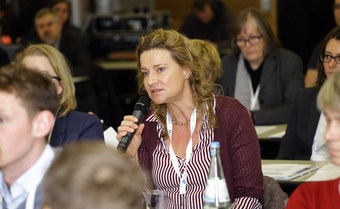Nitrate and (Ground-) Water – One Problem, Many Strategies
International experts discuss management strategies at the ABC/J Expert Talk.
Roughly one year ago, the European Commission referred Germany to the European Court of Justice for allegedly neglecting to take stronger groundwater protection measures. To this day, the limit value of 50 mg/l nitrate is exceeded at about 18 % of Germany’s measuring points. The agricultural sector is viewed as the main culprit. In particular, the spreading of animal and mineral fertilizers but increasingly also the digestates of energetically exploited biomass lead to widespread overfertilization of agricultural areas and therefore excessive nitrate contents in the groundwater.
 The ABC/J Expert Talk brings together active scientists and those responsible from society at large and provides a dialogue platform for exchanging ideas. Accordingly, ample time was scheduled for discussion rounds.
The ABC/J Expert Talk brings together active scientists and those responsible from society at large and provides a dialogue platform for exchanging ideas. Accordingly, ample time was scheduled for discussion rounds.
Copyright: Geoverbund ABC/J │ Forschungszentrum Jülich
Due to the pressing and controversial nature of the issue – Germany faces six-figure financial penalties per day if found guilty – Geoverbund ABC/J hosted an Expert Talk in Cologne on 29 and 30 November 2017. Decision- and policymakers accepted the invitation to the event, which sought to provide a platform for dialogue: “We are particularly delighted that in addition to scientists, there were also representatives from ministries, regional and local authorities, water utilities, water boards, chambers of agriculture and agricultural associations, engineering consultants, and farmers present at the event,” says Prof. Frank Wendland, who organized this year’s Expert Talk and heads a working group at Forschungszentrum Jülich concerned with the modelling and management of river catchment areas. The aim of the ABC/J Expert Talk was to bring together the various social actors and provide them with fresh impetus for their work.
During 18 specialist talks, the 85 international participants learned more about the current state of nitrate pollution in the groundwater of Germany, its European neighbours, and in California, USA. According to Wendland, “high nitrate levels occur in almost all regions with large livestock populations in north-western Germany, but also in our neighbouring countries Denmark, the Netherlands, and Belgium. Despite the fact that recent years have seen significantly increased degrees of exploitation of organic nitrogen fertilizers and improved management concepts, the sheer quantity of animal manure produced by livestock farming is viewed as one of the main reasons why the objectives of the Water Framework Directive have not yet been achieved.”
Additional topics addressed at the one-and-a-half-day event included the effects of nitrate fertilization on flowing waters and oceans as well as an exchange of views on various management strategies. In the end, one thing is clear: there is no “ultimate solution”. The variety of the different spatial conditions in the affected regions is the most important reason for this, as can be verified by a comparison of the nitrate pollution situations within Germany, but also with those in Slovenia and Greece.
So what will the future hold for Germany? “It is possible that the environmental quality objectives will not be achieved in some regions even if the current regulatory law is tightened. It is generally important that regional solutions are further developed in the various livestock, farming, and special crop regions,” says Wendland.




